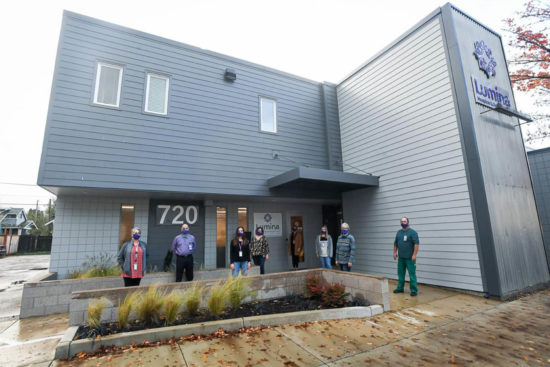Source: Corvallis Gazette Times, published on Nov 30, 2020, updated Dec 3, 2020
“My parents felt like — my family felt like — they were there 24/7 for us,” she said in a phone call to the Gazette-Times. “I could call first thing in the morning, the middle of the night, and somebody would be there for me and my parents.”
The Corvallis-based organization provided at-home chaplain visits, massages and other services “that are just above and beyond the basic hospice service” to soothe her ailing parents. At a very dark time, Scoville said, Lumina “changed their lives and our lives so we could focus on being a family.”Scoville — now the vice chair of Lumina’s board of directors — said her story provides examples of the “margin of excellence” Lumina’s leaders say they want to keep up following the organization’s 40th anniversary. Lumina held a virtual benefit to commemorate the milestone earlier this month, which included a look back on its history and its hopes for the future.
“I think we’re at this very interesting time where we have this very strong history and foundation,” said Lumina Executive Director Elizabeth French in the phone call with Scoville. “We want to be able to continue those (pre-existing services). But we also want to be able to serve more patients within, frankly, a bigger scope.”Ever hopeful, the nonprofit exceeded its fundraising goal following the Nov. 5 virtual benefit, raising over $75,000 from the community since that day.
According to Angela Hibbard, Lumina’s development, marketing and outreach director, over 400 hospice and palliative care patients are served by the organization with the help of its staff and volunteers. Additionally, support to over 1,500 community members is provided annually through Lumina grief counseling, caregiver support and other educational programs.
These efforts were launched in 1980, when founders Betty Johnson, David Connell, George Constantine, and David and Jean Kliewer started the Benton Hospice Service. Constantine, who appeared in a video during the virtual benefit, recalled being approached by Johnson about starting a local end-of-life service operation in the 1970s.“She forwarded the request that I might be interested in becoming involved in a new effort called a hospice … so I thought, ‘That might be worth a curious effort to look into it,’” Constantine said. “We started from scratch. Our first inspiration was do it as a stand-alone; do it as independently of any other organizations as you can, and do it for free.”
According to French, the organization has “never turned anybody away from hospice care because of their inability to pay,” thus keeping that inspiration alive.“Hospice … is really designed to support patients and their families through the end-of-life process,” French said. “That requirement is relatively minimal. Our hospice has built into it that your family will need support during grief.” Although the organization became Medicare-certified in 1991, modern-day Lumina doesn’t receive additional funding for services like its one-on-one or group bereavement counseling. Services like these, combined with a low nurse-to-patient ratio, are included in what Lumina leaders refer to as their “margin of excellence.” “What that means is for a nurse that is a case manager with Lumina, he or she would be expected to support 10 to 12 patient families at a time,” French said. “Nursing is a very busy profession. Certainly in most for-profit hospices, (the ratio is) a closely-guarded number … but substantially higher than that.”
A transition program was added to Benton Hospice Service in 2010 to counsel patients who were diagnosed with serious illnesses but not yet eligible for hospice care. Case management for palliative care was added in 2015. The organization was renamed Lumina Hospice & Palliative Care in 2017 to reflect those expansions.“We really felt that it was time to sort of have a name that represented our organization more clearly,” said French during the virtual benefit. “There was a great deal of thought and market research and, through that lengthy and complete process, Lumina was chosen. And the tagline at the time, of course, was ‘illuminating care.’” Although the organization started as purely volunteer-run, it continues to be run by a majority of around 100 loyal volunteers including the board of directors, Hibbard said, with around 60 paid employees. After initially serving just Benton County, Lumina’s at-home services have expanded to thousands of patients throughout the mid-valley. Its 1,000th patient was seen in 1999, that number tripled by 2008, and Lumina’s 6,000th patient was seen in 2019. French said this capability is only possible because of Lumina’s staff and volunteers.
“I do have the privilege of working amongst angels every day,” she said. “We could not do what we do without that strong support.”
Scoville, the incoming board of directors chair for 2021, said she looks forward to the opportunities to come at Lumina’s new hub at 720 SW Fourth St. in Corvallis, which opened in August 2019.
“That new building was strategically located downtown so the community, who we really are focused on serving, has access to Lumina and its services,” Scoville said. “It’s a fantastic building and has these wonderful community spaces that, pre-COVID, we had many plans for hosting community events.”In the meantime, in-person programs have been moved online. Some have been attended by as many as 200 participants, French said, so Lumina leadership is considering making virtual events a permanent fixture to broaden the organization’s services.
